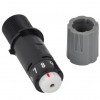Hi everyone. It's Verity here from Pretty Little Button bringing you another project. For today's project, I'm using the non-adhesive Stencil Material. I have created my own stencils before using a variety of media similar to the stencil material, however, this was the first time I have used Silhouette's stencil material. I was really impressed with it - it is thin so cuts well but the material isn't flimsy like a piece of acetate, so it holds its shape well. In today's project, I wanted to show you how you can create layered stencils to use with inks, mouses, embossing powders and more, to get a multicoloured stencilled image.
Creating a layered Stencil detail:
Choose a design from the Design store, I choose this beautiful tree by Echo Park. When selecting a design to stencil in layers, go for a simple design where you can easily identify 2-3 layers. If it is too intricate it will be more difficult to cut and align though this can be done. For now, when starting off, go for a simple layout first.
When opening the design up with this tree from Echo Park, the leaves and trunk are separate. However, in order to use it as a stencil, you need to make a few adjustments. First of all, let's take the leaves.
As you can see above, many leaves are very close together or overlapping. It is best to ungroup the leaves and move these with your arrow keys to ensure they aren't overlapping and have a little space between them. If they are very close, this will affect the stability of your stencil.
In addition, you will also want to check for any areas that aren't attached to the stencilled outline. As you can see below, there are several areas where the branches overlap, creating shapes within the trunk. If you cut it as is, the shapes are not attached to the stencil and your loose this definition.
There is an easy remedy to this - the knife tool! Using the knife tool (the left-hand toolbar ), crag a line down between the two points where you want the opening to appear at. Once the cut has been made, you need to seal the ends.
Right-click on the design and select 'make compound path' and then right click selecting edit points. Using the points, join up the ends as seen above so you can have one continuous cut line.
When you are ready to cut, make sure you do a test cut first! For me, the cut settings on stencil material were just right for my machine, but unless you have used it before you never know!
To create the cards, I used a variety of pigment inks, embossing powder and Tonic Nuvo Mousse.
For this card, I inked clear embossing ink over the stencil direct to paper. This was covered with copper embossing powder and heat set. For the leaves, I layered the stencil over the top and applied Tonic Nuvo paste with a palette knife. This was mounted on a card base, and I added a layered die-cut sentiment along with a smaller stamped sentiment.
For the second card, I applied pigment ink for the trunk and heat embossing the leaves in a beautiful red embossing powder. To finish, I added a simple sentiment.
For the last card, I used a white pigment ink for the trunk and a beautiful pale turquoise nuvo mousse for the leaves. A few matching sequins were added along with an embossed sentiment.
If this has inspired you to try this out, please post below. I would love to see it!
Until next time,
Verity

Profile | Pretty Little Button Blog | Instagram | Facebook
Tree by Echo Park - Design ID #64906













really love this idea it is so effective and your cards are so pretty will definitely be trying this out thanks for the Inspiration xxx
ReplyDelete